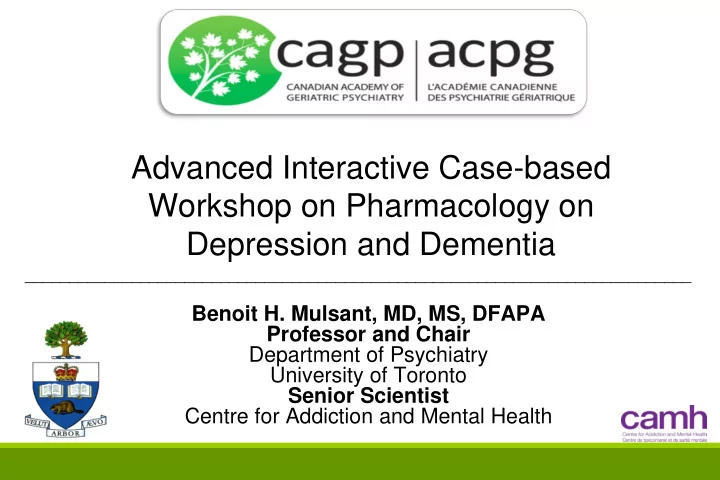

Advanced Interactive Case-based Workshop on Pharmacology on Depression and Dementia ___________________________________________________________________________ Benoit H. Mulsant, MD, MS, DFAPA Professor and Chair Department of Psychiatry University of Toronto Senior Scientist Centre for Addiction and Mental Health
Faculty/Presenter Disclosure • Faculty: Benoit H. Mulsant • Relationships with commercial interests (past 5 years): • Grants/Research Support: Current: Brain Canada, Canadian Institute of Health Research, National Institute of Health, Several Foundations • Bristol-Myers Squibb, Eli Lilly, and Pfizer have provided medications (or matched placebo pills) for NIMH-funded clinical trials • Speakers Bureau/Honoraria: None • Consulting Fees: None • Other: Current: Center for Addiction and Mental Health, University of Toronto, University of Pittsburgh, Roche (travel support in 2011)
Disclosure of Commercial Support • This program has received no financial or in-kind support from any commercial organizations. • Potential for conflicts of interest: The use of all available antidepressants, antipsychotics, and several other psychotropic medications will be discussed during this program.
Mitigating Potential Bias • Generic names will be used. • Generic forms are available for most medications that will be mentioned.
Key Learning Objectives At the conclusion of this session, the participants should be able to: 1. Assess the evidence supporting the efficacy of antidepressant medications in the treatment of late-life depression. 2. Assess the risks of antidepressant medications used in the treatment of late-life depression. 3. Discuss strategies to address treatment-resistant late-life depression (i.e., depression that does not respond to an adequate antidepressant trial).
Recommend
More recommend